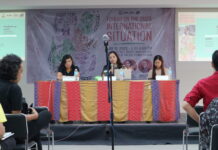MANILA — Health experts and lawmakers have expressed dismay over the Philippine government’s silence on Trade-Related Aspects of Intellectual Property Rights (TRIPS) as developing countries continue to grapple with access to COVID-19 vaccines.
“We have seen the TRIPS waiver for over six months now and the deafening silence of the Philippine government is very alarming despite our vaccine czar Carlito Galvez mentioning that eighty percent of the vaccines were already procured by rich countries,” Josh San Pedro, spokesperson of Coalition for People’s Right to Health said.
TRIPS, which covers medicines, is intended to protect innovations and inventions of pharmaceutical products through a minimum of 20 to 25 years patency period. This will supposedly provide pharmaceutical companies an opportunity to recover the investments used in developing these new medicines.
Both India and South Africa have been in talks with other developing countries to support the suspension of TRIPS in medicine since October 2020. This is meant to ensure better access to medicines and eliminate extensive negotiations that result in delays in producing and acquiring vaccines, and testing kits amid the global pandemic. The waiver will cover agreements on trade secrets, patents, copyright, and industrial designs.
In an online interview with Bulatlat, San Pedro said the government is quiet because they fear losing the investments of foreign pharmaceutical firms that are reportedly planning to build a production facility here.
“It seems that they were just relying solely on cash loans and vaccines from the COVAX facility,” he added.
Economic Implication of TRIPS in the Philippines
In an online forum last May 26, the Coalition for People’s Right to Health discussed the political, economic, and health implications of TRIPS in the Philippines.
Sonny Africa of independent think tank Ibon Foundation said vaccines are key to economic recovery and that TRIPS waiver promises faster and cheaper herd immunity.
Based on data from Ibon Foundation and Duke University, high-income countries with lower populations have more access to vaccines than low-income countries with significantly higher populations (estimated at 85% of the world’s population). Canada, for example, with 38 million people can vaccinate their whole population ten times over, based on the number of vaccines they purchased at 381 million doses.
The Philippine government aims to acquire seventy million doses for 2021 but, as of May, only eight million have been received.
On average, at least 42,000 doses of vaccine are being administered per day. If this continues, Africa said, it will take the country nine years to complete the 140 million administered doses needed for herd immunity.
“The longer we create these artificial scarcities because of market-driven monopolies, the more the pandemic becomes a man-made capitalist-driven catastrophe. Economic collapse and suffering not from the lack of vaccines but from poor public health response and lack of aid and economic stimulus”, he added.
Gabriela Women’s Party Rep. Arlene Brosas shared that there was no mention of TRIPS in congressional hearings and legislators have no prior knowledge in regards to TRIPS waiver and the Philippines position on the issue. Makabayan Bloc has already filed a resolution urging the government to support the TRIPS waiver.


















